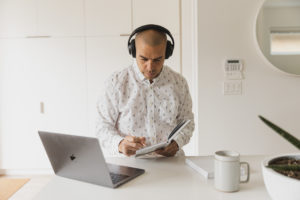Originally published on Medium.
—
What is the first thing you do after waking up? What do you do while you’re on the train? During your lunch break? In between meetings? After dinner? Right before bed?
The answer is likely the same for all of these: scrolling through content on your phone. Whether it’s your email or Slack, or it’s social media or news, people today are spending an incredible amount of their “downtime” ingesting content on their phones. This is a serious problem.
Our brains are electrical devices, they are computers. They use roughly the equivalent energy of a lightbulb. They take in content from our senses all day, process them and return responses. They process complex problems and generate big ideas — but only if we give our brains the space to do so.
As incredible as our brains are, they need downtime. They need time to rest and rebuild. They need time to process the information they take in about our lives and help us understand how we feel about things. When we fill up every waking moment scrolling on our phones, whether it’s work-related or Instagram, we are forcing our brains to continually take in new information without giving them a chance to process.
Mornings
The first 30 minutes after you wake up are perhaps the most important in determining how your day will go. Your brain is changing states from a subconscious to a conscious state and literally warming up. If you immediately roll over and open your email, you’re starting your day in a chaotic, busy state which will likely lead you to feel that way all day. Instead, consider spending the first 20–30 minutes with a short meditation, looking out the window, thinking about what you’re grateful for and what your priority is for the day. It will make a massive difference for how you feel throughout the day and over time you will notice an improvement in cognitive performance. You will feel clearer, more alert and less reactive.
During the Day
You just got out of an intense meeting. You’ve got 15 minutes until your next thing starts. Or you’ve just finished a long day and you’re on your way home to your boyfriend, girlfriend or family. It’s in these moments throughout the day that you have a choice about what to do with your time.
When you’re scrolling through Instagram, it may seem like a relaxing activity, but your brain is working hard to process all the information it’s taking in. Where is that? What are they doing? Do you want to do that? Did they just buy that? Are you impressed or happy for them or jealous? Are you judging them? This cognitive process is happening every. image. you. scroll. through.
In a single session, you might look at 50 or 150 images. For each image, your brain is processing a lot of information. This is absolutely not relaxing for your brain.
Instead, if you spent your 15 minutes between things by going for a walk, or listening to some music, or just sitting and drinking a glass of water, your brain would have time to process whatever happened last. Even if it seems like you are doing “nothing”, your brain is processing the content subconsciously. You’re determining what you think about it, how you felt about the interaction, and connecting the information with other knowledge you have stored. You’re THINKING. Which makes you smarter. Facts.
Or maybe you could spend 15 minutes daydreaming about a new business you want to start, or a vacation you want to go on, or an art project you want to start? Taking the time to create a vision is the first step in creating the life you want.
Notifications
Another way to free up your mind space is to turn off notifications for as many things as possible. Many people get notified about every like on Instagram, or every email that comes in. Consider whether this is really necessary. I am the CEO of a fast-growing company in the digital space. I only get notifications for text messages and 5 of about 45 slack channels. No email or social media notifications. It has made a huge difference in the quality of my thinking and my day. If I’m waiting for an important email, I can check for it. I really don’t need to be notified every time someone emails me. I don’t think anyone does. I definitely don’t need to know when someone likes a photo I share on social media. If we got tapped on the shoulder that often by someone at work, we’d flip out at them, yet we allow our phones to interrupt us all day.
Before Bed
In terms of social media or news feeds before bed, see the last section. The same way your brain needs time to warm up in the morning, it needs to cool down before bed. Literally actually: the temperature in your brain drops when you sleep. Taking some time before bed to read fiction, meditate, listen to music or just relax and think for 20–30 minutes will have a huge impact on the quality of your sleep. Instead of processing all the new information you just forced your brain to ingest right before bed, your subconscious mind can process your day.
Now let’s talk about email right before bed. First of all, is the work you’re doing so immediate and important that people will die if you don’t reply to an email at 10:30pm? If so, this article isn’t for you. Please continue saving lives by responding to emails 24/7. For the rest of us, doesn’t it seem a little silly when you put it in this context?
First of all, by sending emails late at night or early morning, you’re signaling to people that you’re available any time, and creating an expectations loop that you’ll need to live up to.
Second, while you’re banging off emails at 10:30pm you could be processing the day you just had; what went well, what didn’t, how to solve a big problem you’re working on, whatever. You know.. THINKING!
As a boss, I’d way rather have an employee that spends the last 30 minutes processing their day than responding to emails. More importantly, I don’t want an employee responding to emails when they are tired, burnt out or not 100% focused on what they are typing. If your boss expects you to respond to emails late at night, perhaps you should send them this article, or find a better boss.
When You’re Sleeping
The majority of young people I ask (under 30 I mean, gawd I’m old) tell me they leave their phones on, next to their bed, all night. That means while you are sleeping, your phone is either buzzing, dinging or lighting up every time a notification comes in. This is impacting the quality of your sleep. Whether you wake up fully or not, it is difficult for your mind to relax fully into deep REM sleep if it knows there are notifications coming in.
If you’re trying to get physically fit, you don’t work out 24 hours a day. You work out for an hour or two and then you let your muscles rest and rebuild. Our brains are the same. They need rest and rejuvenation. Today’s never-off world can make you feel frantic or like you always need to be checking your phone or responding to every notification. However, that is not the path to peak productivity, in fact, it’s the opposite. To be your best self, your happiest and clearest self and to create the results you want in your life, you need to start respecting the most complex and important organ in your body.





